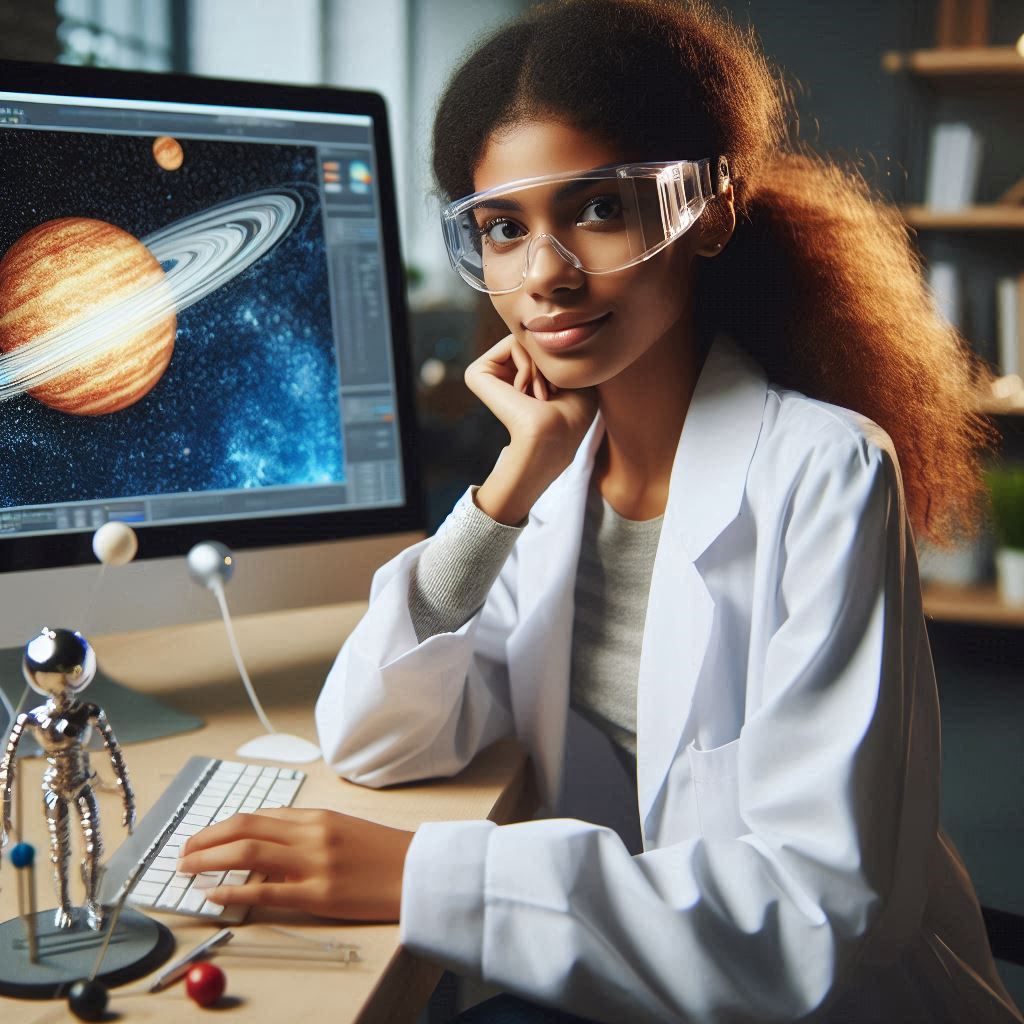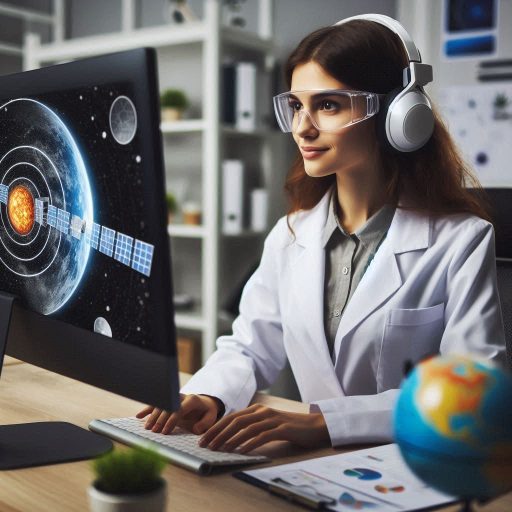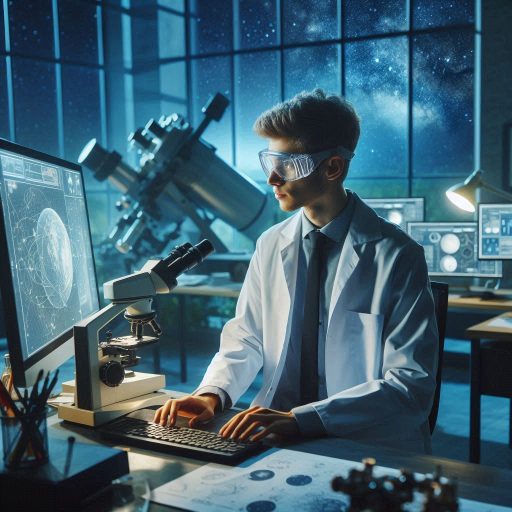Introduction
This blog post will explore the daily life of a space scientist.
It will provide insights into their typical workday, tasks, and responsibilities.
Understanding this daily routine helps demystify the profession and highlights the dedication involved in space science.
Knowing how space scientists spend their days is important for several reasons.
First, it sheds light on the skills and education required for this career.
Readers will learn about the diverse tasks involved, from data analysis to conducting experiments.
This information can guide aspiring scientists in making informed career choices.
Additionally, understanding their daily life reveals the challenges space scientists face.
They often work under pressure to meet deadlines and secure funding for projects.
This context emphasizes the importance of resilience and adaptability in their roles.
Setting this context allows readers to appreciate the significance of space science.
Space scientists contribute to our understanding of the universe and drive technological innovations.
By grasping the intricacies of their daily routines, readers can better appreciate their work and the impact it has on society.
This blog post aims to provide a comprehensive view of a space scientist’s daily life.
Morning Routine
Waking Up Early to Start the Day
Space scientists often wake up early to maximize their productivity.
Rising at dawn helps them embrace a quiet moment before the day begins.
This time allows for mental preparation and reflection on the day’s tasks.
Early mornings provide an opportunity to set goals for the day.
Scientists often review their agendas and prioritize their responsibilities.
A structured start helps them manage their time effectively and meet deadlines.
Exercise or Meditation to Prepare for Work
After waking, many space scientists incorporate exercise or meditation into their routines.
Engaging in physical activity helps boost energy levels and improve focus.
A morning workout can range from a brisk walk to a rigorous gym session.
For those who prefer a calmer start, meditation offers an excellent alternative.
This practice helps clear the mind and reduce stress.
Many scientists find that meditation enhances their concentration for the day ahead.
Both exercise and meditation contribute to overall well-being.
Maintaining physical and mental health is crucial in demanding fields like space science.
A balanced morning routine fosters resilience, helping scientists tackle challenges throughout the day.
Breakfast and Coffee to Kickstart the Day
A nutritious breakfast is an essential part of a space scientist’s morning routine.
Eating a balanced meal fuels the body and mind.
Scientists often choose whole grains, fruits, and proteins to energize themselves.
Coffee is a common beverage choice for many scientists.
The caffeine boost helps increase alertness and focus during early hours.
This ritual often becomes a comforting part of their daily routine.
After breakfast, scientists prepare for their workday ahead.
They gather necessary materials, such as research notes and data sets.
Being organized helps them stay on track and ensures they are ready for meetings or experiments.
A Typical Workday
Once at work, the day can involve various tasks.
Space scientists might spend time analyzing data collected from space missions.
This analysis often involves using advanced software and algorithms to interpret complex information.
Collaborating with colleagues is another essential aspect of their work.
Scientists regularly attend meetings to discuss ongoing research projects.
Sharing insights and feedback fosters a collaborative environment that promotes innovation.
Additionally, fieldwork can be a significant part of a space scientist’s daily routine.
Conducting experiments or collecting samples requires careful planning and execution.
These activities often take scientists to unique locations, whether on Earth or through space missions.
The daily life of a space scientist is dynamic and fulfilling.
Waking up early sets a productive tone for the day.
Incorporating exercise or meditation helps maintain focus and resilience.
A nutritious breakfast, paired with coffee, kickstarts their workday.
Throughout the day, scientists engage in data analysis, collaboration, and fieldwork.
This varied routine keeps their work engaging and impactful.
By balancing personal well-being with professional responsibilities, space scientists contribute significantly to our understanding of the universe.
Each day offers new opportunities for discovery and innovation in the field of space science.
Planning and Preparation
Checking Emails and Messages
Every morning, space scientists start their day by checking emails and messages.
They review communications from colleagues, collaborators, and research institutions.
This process helps them stay updated on ongoing projects and developments.
Important messages may include updates on research findings or invitations to meetings.
Space scientists prioritize emails that require immediate attention.
Responding promptly ensures effective collaboration and maintains project timelines.
They often communicate with team members across different time zones.
This aspect of their work fosters a global network of researchers.
Maintaining these connections is crucial for successful collaborations.
Additionally, space scientists may receive alerts about upcoming conferences or workshops.
These events provide opportunities to share research and learn from others in the field.
Staying informed about these opportunities is essential for professional growth.
Reviewing Schedule and Tasks for the Day
After checking emails, space scientists review their schedules and tasks.
They assess meetings, deadlines, and research activities planned for the day.
This overview helps them prioritize tasks effectively.
Each day may involve meetings with research teams or project updates.
Space scientists collaborate with engineers, technicians, and fellow researchers.
Effective communication during these meetings is vital for project success.
They also set specific goals for the day.
This might include completing data analysis or preparing research reports.
By defining daily objectives, space scientists can maintain focus and productivity.
Adjustments to the schedule may occur throughout the day.
Unexpected challenges, such as equipment issues or new research findings, can arise.
Flexibility is essential in adapting to these changes while staying productive.
Gathering Necessary Equipment and Materials for Experiments or Research
A significant part of a space scientist’s day involves preparing for experiments or research.
They gather necessary equipment, materials, and samples for ongoing projects.
This preparation is crucial for successful experimentation.
Space scientists often work in laboratories or research facilities.
They check the availability of instruments, software, and supplies needed for their tasks.
Ensuring all materials are ready helps streamline the research process.
In addition, they may collaborate with technicians to set up experiments.
This collaboration ensures that everything functions correctly and safely.
Attention to detail during this phase is essential to avoid potential setbacks.
During fieldwork, space scientists gather samples and data directly from their research sites.
They may need specialized equipment for specific experiments.
Gathering the right tools enhances the accuracy and reliability of their findings.
The daily life of a space scientist is filled with diverse tasks and responsibilities.
Checking emails, reviewing schedules, and preparing equipment are just a few aspects of their workday.
Each task contributes to their overarching goal of advancing our understanding of the universe.
Effective communication, organization, and preparation are crucial skills for success in this field.
By managing their time and resources wisely, space scientists can make meaningful contributions to space exploration and research.
Their work inspires future generations to explore the cosmos and uncover its mysteries.
Each day brings new challenges and opportunities for discovery in the exciting world of space science.
Read: Botany Career Fairs and Networking Events
Conducting Experiments
Setting Up Equipment in the Lab or Observatory
A space scientist’s day often starts with setting up equipment in the lab or observatory.
This setup includes calibrating instruments, ensuring they function properly.
Scientists check all components, such as sensors and cameras, before conducting any experiments.
Preparation is crucial, as small errors can lead to inaccurate results.
A space scientist pays close attention to detail during this phase.
They organize their workspace to maintain efficiency throughout the day.
Collaboration with technicians and other scientists often occurs during setup.
This teamwork helps ensure that all equipment is ready for testing.
Effective communication is essential for coordinating efforts and troubleshooting issues.
Once the equipment is set up, the space scientist reviews their research objectives.
They outline the specific tests or observations planned for the day.
This planning helps maintain focus and ensures productive work sessions.
Running Tests and Collecting Data
After setup, the space scientist begins running tests.
They follow established protocols to collect data on celestial phenomena or equipment performance.
These tests may involve observing celestial bodies through telescopes or analyzing samples collected from missions.
During this phase, precision is paramount.
Scientists monitor equipment closely to capture accurate readings.
They may adjust settings or angles to enhance data quality.
Data collection can be time-consuming, requiring patience and persistence.
Depending on the project, tests may run for hours or even days.
Scientists often work in shifts to ensure continuous data acquisition.
While running tests, they document their observations and results meticulously.
This record-keeping is vital for future analysis and reporting.
Clear documentation allows scientists to track their progress and revisit earlier findings.
Analyzing Results and Making Observations
Once data collection concludes, the space scientist shifts to analysis.
They use specialized software to process and interpret the collected data.
This analysis helps identify patterns, anomalies, and trends within the data.
The scientist reviews the results and compares them to established hypotheses.
This comparison is crucial for drawing meaningful conclusions.
They may need to run additional tests to confirm findings or explore unexpected results.
Collaboration remains important during this phase.
Scientists often discuss their findings with colleagues to gain different perspectives.
These discussions can lead to new insights and research directions.
After analyzing the data, the space scientist prepares reports or presentations.
They summarize their findings and highlight significant observations.
Sharing results with the broader scientific community contributes to collective knowledge.
The daily life of a space scientist is filled with dynamic and engaging tasks.
Setting up equipment, running tests, and analyzing results are core components of their work.
Each day presents new challenges and opportunities for discovery.
Through their dedication, space scientists contribute to our understanding of the universe and inspire future generations of explorers.
Their commitment to research drives advancements in space science and technology, shaping the future of exploration.
Read: Preparing for a Botany PhD: Tips and Advice
Meetings and Collaborations
Attending Team Meetings to Discuss Progress
Space scientists often begin their workday by attending team meetings.
These meetings provide a platform to discuss ongoing projects and share updates.
Team members outline their recent findings and highlight any challenges they face.
During these meetings, scientists review project timelines and milestones.
They assess whether the team is on track to meet its goals.
These discussions foster accountability and ensure everyone contributes to the project’s success.
Collaboration is essential in space science, where projects often involve diverse expertise.
Team meetings facilitate communication among scientists from various disciplines.
This interaction encourages the exchange of ideas and promotes a collaborative environment.
Scientists also use meetings to identify areas for improvement.
They discuss strategies to overcome obstacles and refine their approaches.
This process enhances project outcomes and fosters a culture of continuous improvement.
Collaborating with Other Scientists on Projects
Collaboration plays a vital role in the work of space scientists.
They often partner with colleagues from different institutions and fields.
This teamwork enriches research and provides access to a wider range of resources.
Scientists regularly share data, insights, and methodologies with their collaborators.
This exchange fosters innovation and helps drive projects forward.
Collaborative efforts often lead to groundbreaking discoveries and advancements in space science.
Partnerships with universities, government agencies, and private organizations enhance research capabilities.
These collaborations can lead to joint funding opportunities and shared access to advanced technologies.
Working together amplifies the impact of scientific research.
Additionally, collaborative projects often involve interdisciplinary teams.
These teams bring together physicists, engineers, and computer scientists.
This diversity allows for more comprehensive solutions to complex problems.
Brainstorming Ideas and Sharing Insights
Brainstorming sessions are essential components of a space scientist’s day.
These sessions encourage creativity and foster innovative thinking.
Scientists gather to generate new ideas and explore different approaches to research.
During brainstorming sessions, scientists encourage open dialogue and diverse perspectives.
Each participant contributes their unique expertise, enriching the discussion.
This collaborative atmosphere often leads to fresh insights and innovative solutions.
Sharing insights among team members is crucial for scientific progress.
Scientists learn from each other’s experiences and successes.
This knowledge exchange helps refine research strategies and promotes best practices.
Moreover, brainstorming sessions often inspire new research questions.
Scientists may discover gaps in existing knowledge and formulate hypotheses.
This iterative process of questioning and exploration drives scientific inquiry.
The daily life of a space scientist is dynamic and collaborative.
Team meetings foster accountability and communication, while collaboration enhances research capabilities.
Brainstorming sessions encourage creativity and generate innovative ideas.
By engaging in these activities, space scientists contribute to advancing our understanding of the universe.
Ultimately, their collective efforts lead to discoveries that shape our knowledge of space and beyond.
Read: Interdisciplinary Research: Botany and Other Sciences

Research and Analysis
Reading Scientific Papers and Articles
Space scientists dedicate substantial time to reading scientific literature.
They review research papers published in reputable journals.
This reading allows them to understand current trends and findings in their field.
It also provides insights into methodologies used by other researchers.
Familiarity with new technologies and techniques is crucial.
By staying informed, scientists can incorporate relevant innovations into their work.
Reading articles helps them build on existing knowledge and identify gaps in research.
This process enhances their ability to develop unique hypotheses and experiments.
Scientists often subscribe to academic journals and online databases.
These resources ensure they have access to the latest research.
They may also follow key researchers on social media to gain insights.
Engaging with these sources broadens their understanding of various topics within space science.
Conducting Literature Reviews on Relevant Topics
Conducting literature reviews is another essential task.
Space scientists systematically analyze existing research on specific topics.
This process helps them synthesize information and identify key findings.
A thorough literature review informs their future experiments and studies.
Literature reviews also assist in forming research questions.
By understanding what has already been studied, scientists can pinpoint gaps.
They can then design experiments that address these unexplored areas.
This step is crucial for advancing knowledge in the field.
During literature reviews, scientists document their findings.
They may take notes on methodologies, results, and conclusions from different studies.
This organized approach helps them reference relevant information later.
It also supports the development of comprehensive research proposals.
Writing Reports or Papers on Findings
Writing reports or papers is a significant part of a space scientist’s daily life.
After conducting experiments, they analyze their data and compile results.
Clear communication of findings is essential for advancing scientific knowledge.
Scientists often prepare manuscripts for publication in academic journals.
These papers undergo rigorous peer review before publication.
Writing requires precision and clarity to effectively convey complex ideas.
Scientists must ensure that their arguments are well-supported by evidence.
In addition to academic papers, space scientists write reports for funding agencies.
These reports outline their progress and achievements.
They demonstrate the significance of their work and justify continued funding.
Effective reporting is crucial for maintaining support for ongoing research.
Collaboration with colleagues enhances the writing process.
Scientists often seek feedback on their drafts from peers.
This collaboration leads to improved clarity and strengthens their arguments.
Ultimately, sharing findings contributes to the broader scientific community.
A typical workday for a space scientist involves reading scientific papers, conducting literature reviews, and writing reports.
Each of these activities is essential for advancing knowledge in the field.
Through continuous learning and effective communication, space scientists contribute significantly to our understanding of the universe.
Their dedication to research and collaboration fuels scientific progress, making each day both challenging and rewarding.
Transform Your Career Today
Unlock a personalized career strategy that drives real results. Get tailored advice and a roadmap designed just for you.
Start NowRead: Women in Botany: Celebrating Pioneers and Leaders
Outreach and Communication
Giving Presentations or Talks at Conferences
Space scientists frequently give presentations or talks at conferences.
These events provide platforms to share research findings with peers and industry leaders.
Preparing for a presentation requires thorough knowledge of your research topic.
A successful presentation captures the audience’s attention and conveys complex ideas clearly.
Use visuals like slides and videos to enhance understanding.
Practicing your delivery helps build confidence and ensures effective communication.
Conferences also allow space scientists to network with colleagues.
Building professional relationships can lead to future collaborations and research opportunities.
Engaging in discussions during conferences can provide valuable feedback on your work.
Presentations can inspire and motivate others in the field.
Sharing your passion for space science can spark interest in young scientists.
Communicating your research helps contribute to the broader scientific community’s understanding.
Engaging with the Public Through Outreach Events
Engaging with the public through outreach events is vital for space scientists.
These events allow scientists to share their knowledge and enthusiasm for space exploration.
Outreach initiatives often target schools, museums, and community centers.
During outreach events, space scientists conduct interactive demonstrations and workshops.
These activities help make complex scientific concepts accessible and enjoyable.
Engaging with students can inspire the next generation of scientists.
Space scientists also participate in public lectures and panels.
These events allow for discussions about current research and future missions.
Engaging with the community fosters a sense of connection between science and society.
Moreover, outreach helps raise awareness of scientific advancements and their importance.
Communicating the value of space research can garner public support for future initiatives.
Building a science-literate public is essential for the advancement of the field.
Writing Blog Posts or Articles for the General Audience
Writing blog posts or articles for the general audience is another key responsibility.
This activity allows space scientists to share their expertise beyond the academic community.
Writing in a relatable tone makes science more accessible to everyone.
Blogging offers a platform for discussing recent discoveries, missions, and research trends.
Regularly publishing content helps build your online presence as an expert.
Engaging with readers through comments can foster discussions and further interest.
Additionally, writing articles for popular science magazines can broaden your reach.
These publications often seek expert opinions on current space topics.
Collaborating with editors helps ensure your message resonates with a broader audience.
Content creation enhances communication skills and helps distill complex ideas.
By explaining scientific concepts in simple terms, you improve your ability to convey knowledge.
Writing also allows for self-reflection on your research and its broader implications.
The daily life of a space scientist encompasses various activities, including presentations, public engagement, and writing.
Giving presentations at conferences helps share research and build professional networks.
Engaging with the public through outreach events inspires future scientists and raises awareness.
Writing blog posts and articles allows for sharing knowledge with a broader audience.
These activities collectively contribute to the advancement of space science and enhance the scientist’s impact in the field.
Embracing these responsibilities enriches a space scientist’s career while promoting the importance of scientific exploration.
Lunch and Breaks
Taking a Break to Recharge and Refuel
Amidst intense research and analysis, taking breaks is vital for recharging mental energy.
Short breaks throughout the day help prevent burnout and boost focus.
Stepping away from the workspace allows scientists to clear their minds and gain fresh perspectives.
Many space scientists utilize techniques like the Pomodoro Technique.
This method involves working for 25 minutes, followed by a five-minute break.
These intervals promote sustained concentration and reduce fatigue.
During breaks, scientists might engage in mindfulness exercises or light stretching.
Such activities promote relaxation and improve physical health.
Returning to work after a short break often leads to increased productivity and creativity.
Sometimes, a quick change of scenery can also be beneficial.
Taking a walk around the office or outside offers a refreshing break.
Exposure to natural light and fresh air enhances mood and cognitive function.
Socializing with Colleagues
Socializing with colleagues is another crucial aspect of a space scientist’s workday.
Collaborative environments foster creativity and innovation.
Engaging in discussions about ongoing projects can lead to valuable insights.
Many scientists enjoy informal chats during breaks or lunchtime.
Sharing ideas and experiences strengthens professional relationships and builds camaraderie.
These connections create a supportive workplace culture that enhances job satisfaction.
Attending team meetings provides additional opportunities for social interaction.
These gatherings allow scientists to share progress and discuss challenges.
Team collaboration is essential for successful project outcomes and goal achievement.
Participating in group activities or team-building exercises can further enhance bonds among colleagues.
These experiences cultivate teamwork and encourage open communication.
Strong relationships contribute to a positive work environment and boost morale.
Enjoying a Healthy Meal
Eating a healthy meal during the workday is crucial for maintaining energy levels.
Many space scientists prioritize nutrition to fuel their demanding schedules.
A well-balanced diet enhances cognitive function and overall performance.
Scientists often bring healthy snacks to the office.
Options like fruits, nuts, and yogurt provide quick energy boosts.
Eating nutritious snacks can prevent energy crashes and keep productivity high.
Lunchtime presents an opportunity for a more substantial meal.
Many scientists opt for salads, lean proteins, and whole grains.
These meals promote sustained energy and help maintain focus throughout the afternoon.
Meal planning is essential for busy scientists.
Preparing meals in advance can save time and ensure access to nutritious options.
Making conscious food choices supports both physical and mental well-being.
The daily life of a space scientist is dynamic and multifaceted.
Taking breaks to recharge, socializing with colleagues, and enjoying healthy meals are essential components.
These practices enhance productivity, foster collaboration, and support overall well-being.
By prioritizing self-care, space scientists can thrive in their demanding roles and continue to contribute to the exciting field of space exploration.
Conclusion
The daily life of a space scientist is both dynamic and rewarding.
Each day begins with reviewing data collected from various missions.
Scientists analyze this information, seeking patterns and insights that deepen our understanding of the universe.
Collaboration with fellow researchers is essential, as they share findings and brainstorm new ideas.
Throughout the day, space scientists often attend meetings to discuss ongoing projects and future missions.
They must stay updated on technological advancements and methodologies.
Fieldwork, such as observing celestial events or testing instruments, can also be part of their routine.
Dedication and passion are crucial for success in this field.
Space scientists work long hours to meet project deadlines and ensure accuracy in their research.
Their commitment drives them to push the boundaries of knowledge and technology.
Readers should appreciate the work of space scientists in advancing our understanding of the cosmos.
Their efforts lead to significant discoveries, from the formation of stars to the possibility of extraterrestrial life.
Recognizing the hard work behind these findings fosters greater appreciation for science.
Support for space research helps sustain the passion and innovation in this field.
[E-Books for Sale]
The Big Book of 500 High-Paying Jobs in America: Unlock Your Earning Potential
$19.99 • 500 High-Paying Jobs • 330 pages
Explore 500 high-paying jobs in America and learn how to boost your career, earn more, and achieve success!
See All 500 High-Paying Jobs of this E-Book
1001 Professions Without a Degree: High-Paying American Jobs You Can Start Now
$19.99 • 1001 Professions Without a Degree • 174 pages
Discover 1001 high-paying jobs without a degree! Unlock career tips, skills, and success strategies for just $19.99!




